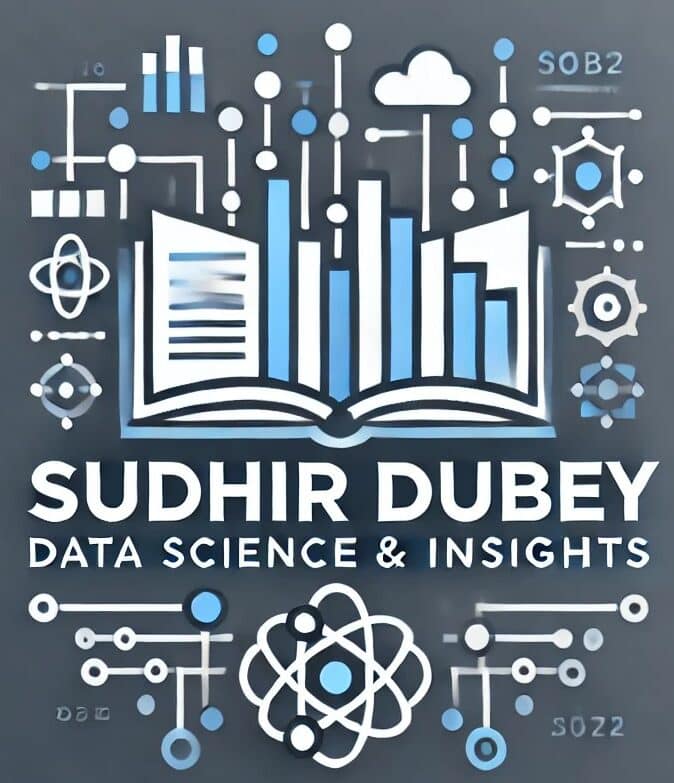10 Powerful Ways AI in Environmental Conservation is Revolutionizing Sustainability
Artificial intelligence is reshaping how we understand, measure, and protect the natural world. From monitoring endangered species to forecasting climate hazards and spotting illegal deforestation, AI in Environmental Conservation is no longer experimental. It is practical, field-tested, and getting better fast. Conservation teams are using AI to make decisions with higher confidence, respond sooner to threats, and stretch limited budgets further than traditional methods allow.
If you enjoy applied technology topics like this, you may also want to explore broader AI research and applications and the growing role of generative AI systems in scientific workflows. Many of the predictive and optimization techniques powering conservation tools overlap with methods discussed in data science articles.
This guide covers ten practical ways AI is being used to protect biodiversity, reduce pollution, support clean energy, and strengthen climate resilience. You will see where AI is already delivering results, where the limits still are, and what good governance looks like so technology helps nature without creating new risks. In other words, we will keep it grounded, useful, and realistic.
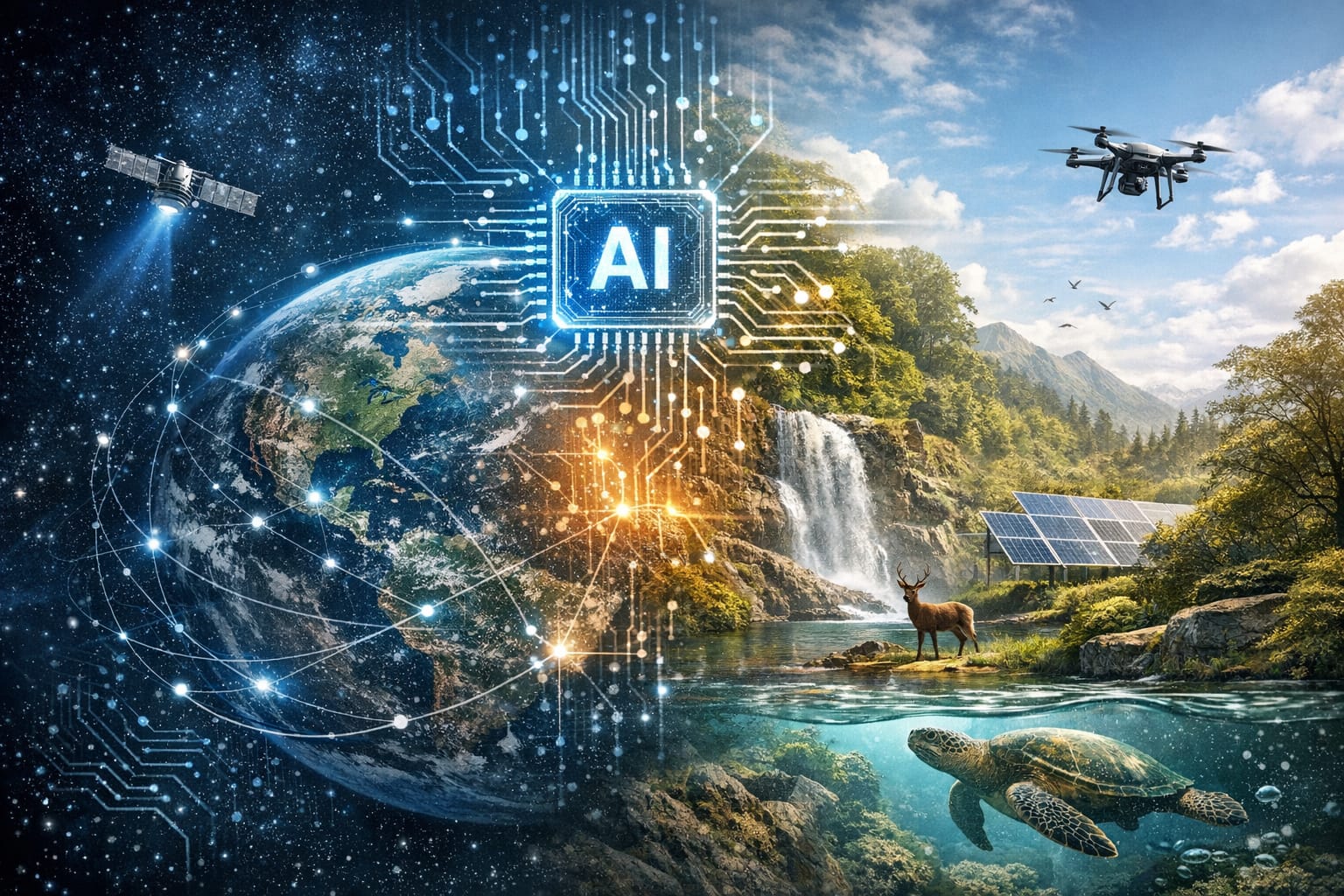
AI in Environmental Conservation
At its core, conservation is an information problem. Where are species declining, why are habitats changing, and which interventions have the highest chance of success? The challenge is that ecosystems are complex, data arrives from many sources, and the pace of change is accelerating. AI helps by turning large volumes of messy data into timely signals. It does not replace ecological expertise. It supports it with speed, scale, and pattern recognition.
In modern projects, AI commonly sits in the middle of a pipeline. Sensors collect data such as images from camera traps, acoustic recordings, satellite imagery, weather readings, or water quality measurements. AI models then classify, detect, or forecast. Finally, human experts validate outcomes and decide what action to take. This human-in-the-loop approach matters. It reduces errors, prevents overconfidence in model outputs, and ensures local context is respected.
It is also important to separate hype from impact. AI is not automatically “green.” Training and running models consumes energy, and poor deployment can increase surveillance risks or create biased outcomes. Responsible conservation AI uses efficient models, transparency about uncertainty, and safeguards for people living near protected areas. It also requires strong data stewardship, because conservation data can be sensitive. For example, precise locations of endangered species can be misused if shared carelessly.
When these principles are followed, AI can be transformative. It can help conservationists detect poaching risks earlier, improve biodiversity inventories, map habitat fragmentation, and guide restoration planning. It can help governments plan climate adaptation and disaster response in ways that protect both people and ecosystems. Most importantly, it can help teams focus limited time on high-impact actions, rather than drowning in raw data.
Smart Monitoring of Wildlife and Biodiversity
Wildlife monitoring has historically been time-consuming. Field surveys and manual counts are labor intensive, limited in coverage, and often seasonal. AI changes the economics of monitoring by making it possible to collect more observations and process them faster. Camera traps are one of the most widely adopted tools here. They can capture thousands of images per week across large reserves. AI computer vision models can then identify species, estimate counts, and detect unusual behaviors that may indicate stress, disease, or human disturbance.
Acoustic monitoring is another powerful use case. Many species announce their presence through sound. Birds, frogs, insects, and marine mammals produce patterns that AI can recognize. In dense forests where visibility is poor, audio-based detection can be more reliable than images. AI can also detect chainsaw sounds, gunshots, or vehicle activity, which can help alert teams to illegal activity. This is especially useful in remote areas where patrols cannot be everywhere at once.
What makes these systems practical is automation with accountability. A good workflow uses AI to triage data and then routes uncertain cases to human reviewers. That approach can increase processing speed dramatically while still maintaining quality. Over time, feedback from reviewers improves the model, and performance becomes more robust across seasons and lighting conditions. This is one of the most compelling examples of AI delivering measurable conservation value today.
There is also a broader, community-driven angle. Citizen science apps use AI to help people identify plants, birds, and insects from photos or audio clips. That expands the data footprint and increases public engagement, which is not a small thing. Conservation outcomes often depend on community support, and the fastest way to build support is to make nature visible and understandable to more people.
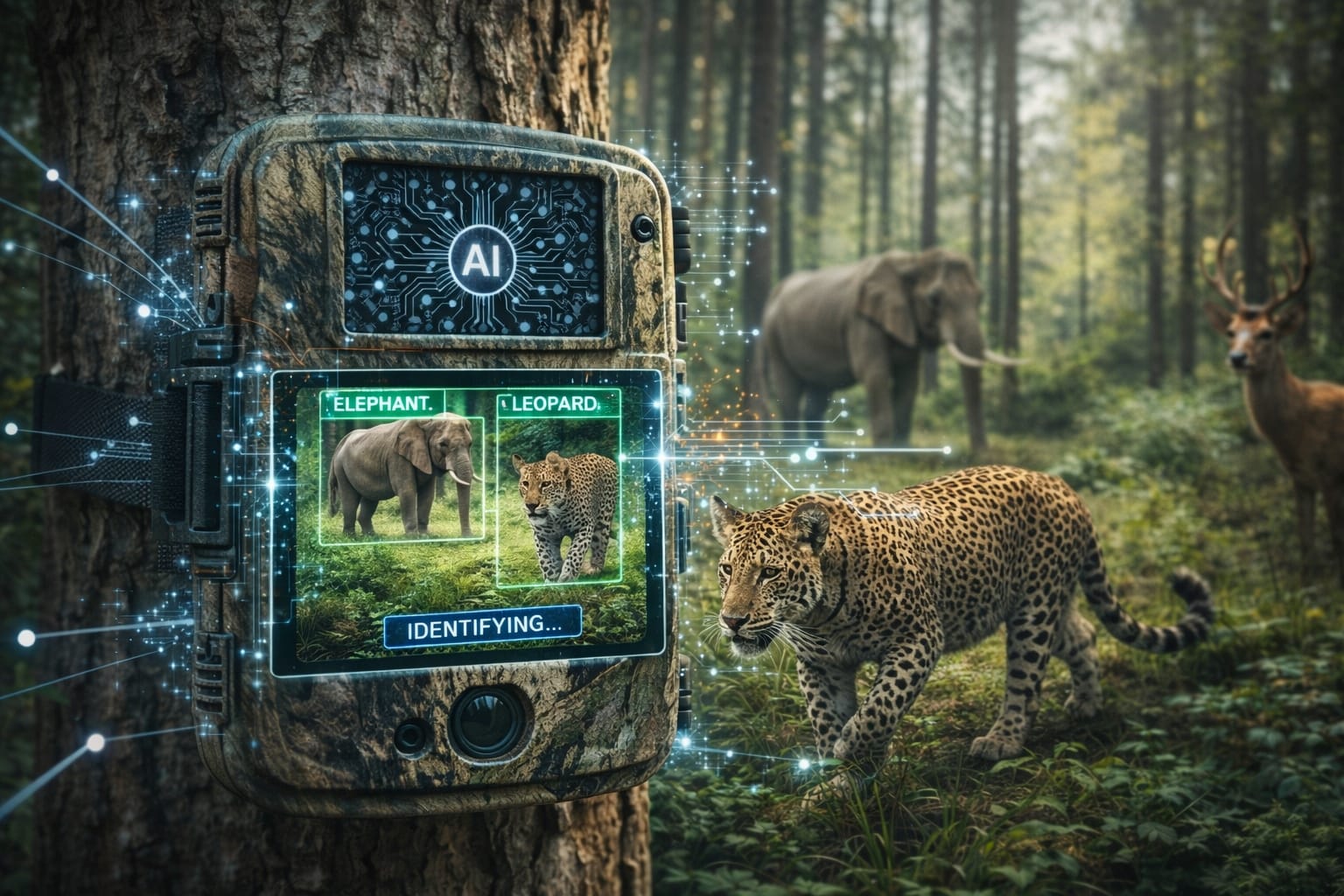
Practical tip for implementation
If you are deploying camera traps at scale, prioritize a consistent setup. Keep camera height, angle, and spacing standardized where possible. Consistency reduces model errors and improves long-term comparability of results. Also, avoid publishing precise GPS locations of endangered species in public dashboards.
Predictive Analytics for Climate Risk and Ecosystem Resilience
Climate change is increasing uncertainty. It is not just about rising temperatures. It is about shifts in rainfall patterns, heat extremes, storm intensity, drought duration, wildfire probability, and compound events where multiple hazards overlap. Conservation planning depends on anticipating these changes, because species ranges move, water availability shifts, and habitats can cross tipping points. Predictive analytics helps by enabling AI models to process large climate and environmental datasets and generate forecasts that support earlier, better decisions.
One practical application is wildfire risk prediction. AI models can combine vegetation health, temperature, wind, humidity, and historical fire patterns to estimate risk at a fine-grained level. This can guide controlled burns, fuel management, and the protection of critical wildlife corridors. Another application is drought forecasting. When drought is predicted earlier, conservation teams can prioritize water management strategies that protect wetlands and reduce stress on species that depend on seasonal water.
Flood risk modeling is also vital. Floods can destroy nests, disrupt migration routes, and damage coastal ecosystems. AI can help identify flood-prone areas and inform nature-based solutions such as restoring wetlands that absorb water and reduce downstream damage. These solutions protect biodiversity while supporting community resilience, which is where conservation and human well-being align in a big way.
Many of these models borrow from methods used in broader analytics and forecasting, which is why the foundations in data science techniques matter. AI models are only as good as the data and assumptions feeding them. Good practice includes uncertainty estimates, frequent retraining, and validation against real-world observations. It also includes transparent communication. A forecast is not a promise. It is a probability statement that should guide preparedness, not panic.
For authoritative climate context and current climate indicators, reputable sources include NOAA and the IPCC. Referencing trusted institutions improves credibility and helps readers distinguish science-backed insights from noise.
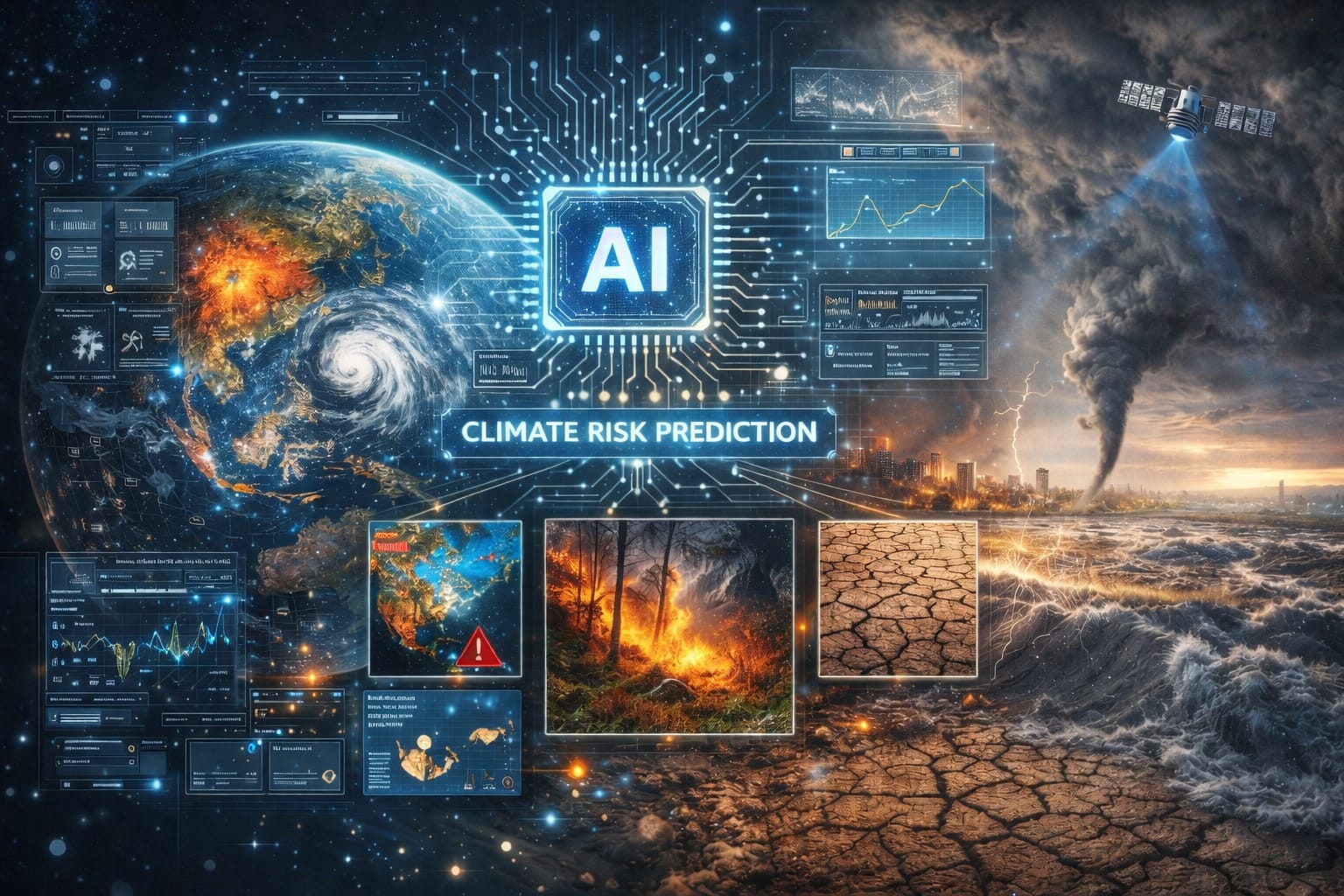
Satellite and Drone Intelligence for Habitat Protection
Habitat loss is one of the strongest drivers of biodiversity decline. The scale of land change makes it hard to monitor using only ground surveys. Satellites help by providing frequent, wide-area imagery. AI helps by making sense of that imagery quickly. This is one of the clearest examples of AI enabling conservation at a global scale. Instead of waiting months for reports, teams can detect changes in days or even hours, depending on data availability and processing pipelines.
Deforestation detection is a standout use case. AI models can compare satellite imagery across time and flag newly cleared areas. They can also detect roads that often precede logging, identify patterns associated with agricultural expansion, and highlight hotspots where enforcement should focus. If you want to reference a widely used public platform for forest monitoring, Global Forest Watch is a strong external resource. It is useful for context and for illustrating how data-driven monitoring is evolving.
Drones complement satellites. Satellites provide breadth. Drones provide depth. Drones can fly under cloud cover and capture high-resolution imagery for specific areas. When paired with AI, drones can identify illegal logging activity, detect invasive species patches, monitor coastline erosion, or count animals in open landscapes. Thermal imaging can detect human activity at night in some contexts, which can support anti-poaching operations, but it must be used carefully with privacy safeguards.
The best deployments combine multiple sources. Satellites identify where to look. Drones and ground teams confirm what is happening. AI reduces the time from observation to action. This is the difference between “we think something changed” and “we have enough evidence to respond quickly.” It is also where governance matters. Data access controls, audit logs, and strict rules on what is shared publicly help prevent misuse.
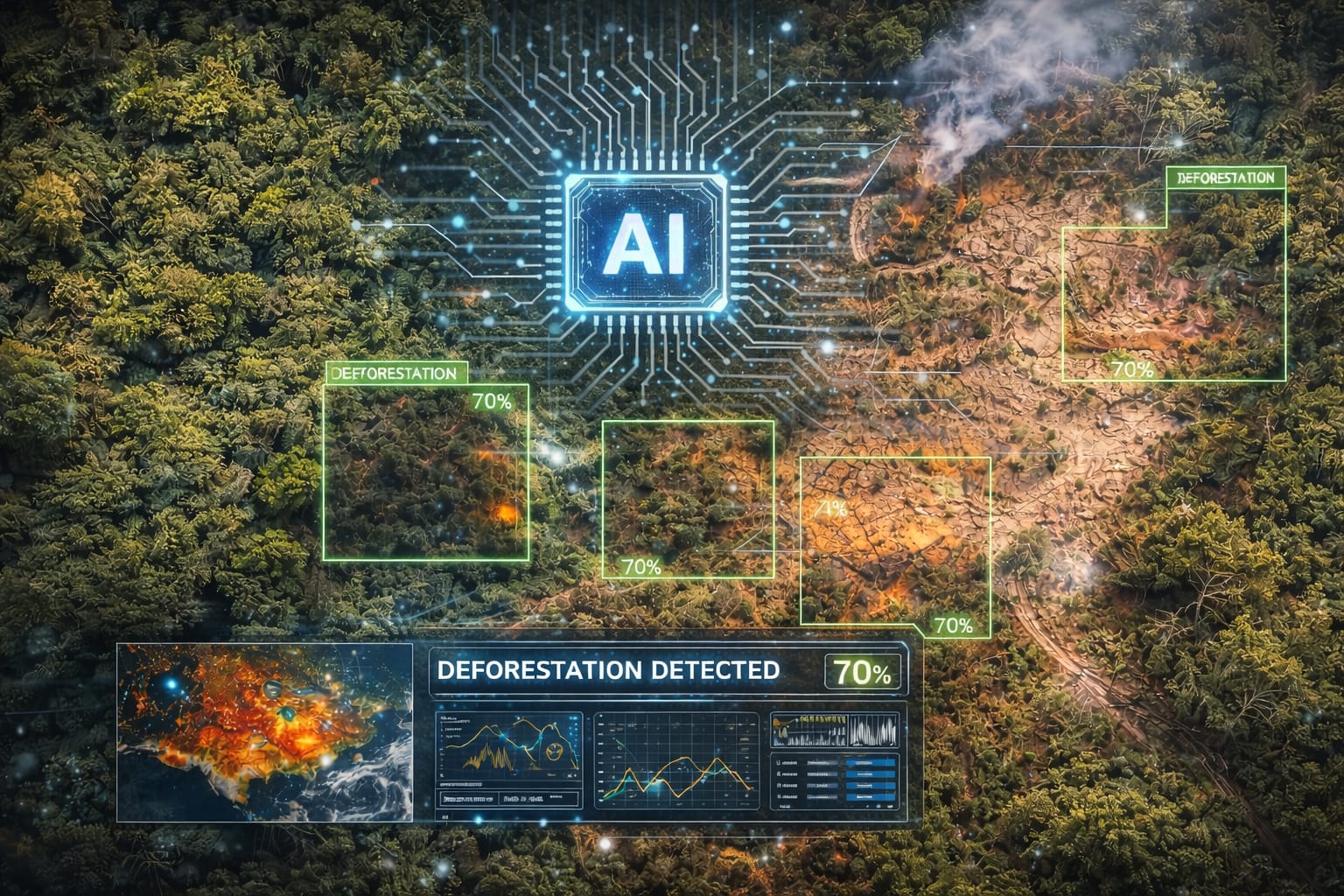
Pollution Detection and Environmental Compliance
Pollution is often invisible until it becomes severe. Air pollution may spike at certain times of day. Water pollution may travel downstream and disperse quickly. Soil contamination can remain hidden for years. AI helps by connecting sensors, satellite indicators, and historical patterns to detect anomalies early. This is especially useful when monitoring large regions, industrial corridors, or complex watersheds.
For air quality, AI can combine sensor readings, weather data, and traffic patterns to estimate pollution levels more accurately and fill gaps where sensors are missing. For water quality, AI can interpret sensor networks that measure pH, turbidity, dissolved oxygen, temperature, and contaminants. It can also help detect algal blooms using satellite and drone imagery. Early detection is not just good science. It can protect fisheries, reduce public health risks, and prevent long-term ecosystem damage.
Compliance is another area where AI can support enforcement. When regulators have better monitoring, they can respond faster and target investigations more efficiently. That said, conservation outcomes depend on more than detection. They require policy, enforcement capacity, and community engagement. AI can strengthen the evidence base, but it does not replace governance.
When discussing pollution and environmental governance, it is helpful to reference reputable international organizations. For example, the United Nations Environment Programme publishes guidance and perspectives on environmental challenges and solutions. Linking to authoritative sources improves trust and provides readers with a pathway to deeper learning.
Restoration and Reforestation with Smarter Planning
Restoration is more than planting trees. Successful restoration depends on selecting the right species mix, planting in the right microclimates, and ensuring long-term survival. AI can help by combining soil data, rainfall trends, slope and terrain, land history, and biodiversity indicators to identify where restoration is likely to succeed. It can also help prioritize corridors that reconnect fragmented habitats, which supports species movement and genetic diversity.
Drones can monitor regrowth and detect issues such as pest outbreaks or invasive species. Satellites can track vegetation health at scale. AI can use these signals to flag underperforming plots early, which allows teams to adjust strategies instead of waiting years to discover failure. This improves accountability for restoration funding and increases the probability of long-term ecosystem recovery.
Another useful capability is carbon measurement support. Restoration is often linked to carbon sequestration goals. AI can estimate biomass changes and support carbon accounting, but estimates should be validated and communicated carefully. Overconfidence in carbon numbers can damage credibility. The best projects treat AI estimates as decision support, not as a substitute for rigorous measurement protocols.
This is also a place where generative AI systems may become more relevant. Generative tools can help teams summarize environmental reports, accelerate documentation, and support scenario planning. Still, decisions should remain grounded in verified data, local ecological knowledge, and transparent assumptions.
Clean Energy and Grid Optimization as Indirect Conservation
Not every conservation win happens inside a protected area. Reducing emissions and pollution is upstream conservation. AI helps integrate renewable energy into power systems by forecasting wind and solar output, balancing demand, and optimizing storage and grid stability. More reliable renewables reduce reliance on fossil fuels, which improves air quality and reduces climate stress on ecosystems.
AI also supports energy efficiency. Smart building systems can reduce energy waste. Industrial optimization can reduce resource consumption and emissions. Over time, these improvements reduce pressure on habitats impacted by extraction, transportation, and pollution. It may feel indirect, but it is highly consequential. Less climate disruption means fewer ecosystems pushed past survival thresholds.
Community Science and Education at Scale
Conservation is a long game, and community engagement is often the difference between short-term projects and lasting impact. AI-powered tools can make citizen participation easier. Apps can help identify species, log sightings, and flag invasive species spread. AI can also help validate community submissions, reduce noise in datasets, and focus expert review on the most valuable observations.
Education benefits too. When people can immediately learn what species they are seeing, they are more likely to care. When they care, they are more likely to support conservation policies and behavior changes. This is not a small effect. It is cultural infrastructure for conservation. If you are exploring broader applied AI topics, your AI category can serve as a natural internal path for readers who want to go deeper.
Ethics, Safety, and Practical Deployment Considerations
AI can help conservation, but only if deployed responsibly. The first risk is sensitive data exposure. Detailed location data for endangered species can be exploited by poachers. Strong access controls, aggregation, and careful publication policies are essential. The second risk is model bias. If models are trained primarily on data from one region, they may underperform elsewhere, leading to missed detections or false alarms. Continuous validation across seasons and locations is required.
Third, there is a risk of over-reliance. AI outputs can feel authoritative, but they are probabilistic. Teams should maintain human oversight, document uncertainty, and design workflows that make it easy to challenge or correct model decisions. Fourth, there is a sustainability factor. Efficient models, responsible computing, and thoughtful hardware choices reduce environmental costs of AI itself.
When these concerns are addressed, AI becomes a strong conservation ally. It can support better decisions, faster interventions, and more transparent measurement. That is what durable conservation progress looks like: better information, better governance, and better outcomes.
Conclusion
AI in Environmental Conservation is not a magic wand, but it is a powerful multiplier for human expertise. It helps monitor wildlife at scale, detect habitat loss faster, forecast climate risks earlier, and plan restoration with better precision. The technology is already making a difference in real projects, and the upside grows when teams combine strong data practices, ethical safeguards, and local ecological knowledge.
If you are building or evaluating conservation solutions, focus on practical value. Start with clear goals, define measurable outcomes, choose reliable data sources, validate models continuously, and keep humans in the loop. With that approach, AI in Environmental Conservation can help protect ecosystems and support a more resilient future.
Want more practical AI insights like this?
Stay connected
for updates and new posts.
FAQs
How is AI used in wildlife conservation?
AI is used to identify species in camera trap images, detect animals from acoustic recordings, estimate population counts, and flag unusual activity that may indicate poaching or habitat disruption.
Does AI replace conservation scientists and field teams?
No. AI supports experts by speeding up analysis and surfacing patterns, but field validation and ecological judgment remain essential for trustworthy decisions.
What are the most effective AI tools for habitat monitoring?
Satellite-based change detection models and drone-based high resolution surveys are widely used. Together they enable broad coverage and detailed local confirmation.
Can AI help with climate adaptation planning?
Yes. AI can forecast wildfire risk, drought likelihood, and flood exposure, helping teams plan interventions earlier and prioritize areas with the greatest ecological value.
What are the biggest risks of AI in conservation?
Key risks include exposing sensitive species location data, biased model performance across regions, privacy concerns with surveillance tools, and overconfidence in probabilistic outputs.
Where can I learn more from trusted environmental sources?
Reputable starting points include UNEP, NOAA, IPCC, and forest monitoring resources like Global Forest Watch.
Author Bio
Sudhir Dubey is an AI researcher and data science educator focused on practical AI deployment and fine-tuning strategies for enterprise use cases.
